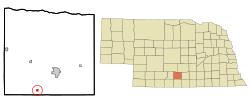Atlanta, Nebraska facts for kids
Quick facts for kids
Atlanta, Nebraska
|
|
|---|---|
|
Village
|
|

Roadside businesses along U.S. Highway 6/34 in Atlanta
|
|

Location of Atlanta, Nebraska
|
|
| Country | United States |
| State | Nebraska |
| County | Phelps |
| Area | |
| • Total | 0.23 sq mi (0.60 km2) |
| • Land | 0.23 sq mi (0.60 km2) |
| • Water | 0.00 sq mi (0.00 km2) |
| Elevation | 2,346 ft (715 m) |
| Population
(2020)
|
|
| • Total | 106 |
| • Density | 458.87/sq mi (177.00/km2) |
| Time zone | UTC-6 (Central (CST)) |
| • Summer (DST) | UTC-5 (CDT) |
| ZIP code |
68923
|
| Area code(s) | 308 |
| FIPS code | 31-02620 |
| GNIS feature ID | 2398005 |
Atlanta is a small village located in Phelps County, Nebraska, in the United States. In 2020, about 106 people lived there.
During World War II, a place called Camp Atlanta was built nearby. This camp held more than 3,000 German prisoners of war (POWs). It's interesting because the camp had more prisoners than the village of Atlanta had people living in it at any time!
Contents
History of Atlanta
Atlanta was founded in 1883. This happened when the Chicago, Burlington & Quincy Railroad built its tracks to this spot. The village was probably named after the city of Atlanta, Georgia.
In the early 1900s, Atlanta was a busy place for local farmers. It had a grocery store, a post office, and a cafe. There was also a tourist shop for people driving on U.S. Route 6.
Farmers used the corn and grain elevators to store their crops. There were also two gas stations. The town hall hosted "Chautauqua" groups, which were like traveling shows with speakers and performers.
Atlanta also had annual events, such as the Atlanta Institute, which was a fair. People enjoyed free outdoor "picture shows" (movies) and the Atlanta Industry Day Picnic. The local schoolhouse taught students from kindergarten through eighth grade.
By the start of World War II, Atlanta had one main street. It was about two blocks long, with only a few business buildings remaining.
Camp Atlanta: A POW Camp
During World War II, a special camp was built next to Atlanta. This was Camp Atlanta, an Allied POW camp. It was made to hold German prisoners of war.
The U.S. Army chose the Atlanta area for this large camp. Construction began in September 1943. At first, people thought it would be a camp for American conscientious objectors.
But by November, locals learned it would be a POW camp for German prisoners. The camp had about 275 regular soldiers and 60 officers guarding the prisoners.
POWs Helping Farmers
The German prisoners were hired to work on local farms. This helped farmers grow more crops, which was important for the war effort. More than 30 local farmers asked for help from the POWs. They paid the government for the work the prisoners did.
After the war ended in 1946, some American soldiers who had guarded the camp returned to live in Atlanta. Also, at least two of the German prisoners applied to become U.S. citizens and came back to live in the area.
Geography of Atlanta
Atlanta is a small village. It covers an area of about 0.23 square miles (0.60 square kilometers). All of this area is land.
Population Changes
| Historical population | |||
|---|---|---|---|
| Census | Pop. | %± | |
| 1910 | 250 | — | |
| 1920 | 258 | 3.2% | |
| 1930 | 207 | −19.8% | |
| 1940 | 173 | −16.4% | |
| 1950 | 147 | −15.0% | |
| 1960 | 107 | −27.2% | |
| 1970 | 101 | −5.6% | |
| 1980 | 102 | 1.0% | |
| 1990 | 114 | 11.8% | |
| 2000 | 130 | 14.0% | |
| 2010 | 131 | 0.8% | |
| 2020 | 106 | −19.1% | |
| U.S. Decennial Census | |||
In 2010, Atlanta had 131 people living in 52 households. The village had about 570 people per square mile. Most of the people living there were White.
About 44% of households had children under 18. The average age of people in the village was about 38.5 years old.
Notable People
- Warren Keith Urbom, a United States District Court Judge, was born in Atlanta.
See also
 In Spanish: Atlanta (Nebraska) para niños
In Spanish: Atlanta (Nebraska) para niños
 | Victor J. Glover |
 | Yvonne Cagle |
 | Jeanette Epps |
 | Bernard A. Harris Jr. |

